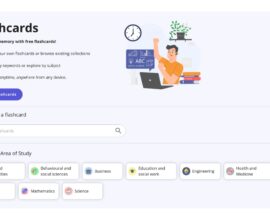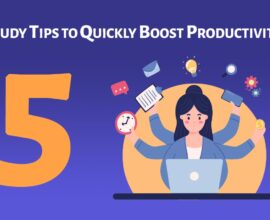Studying From Home: 5 Do’s and 3 Don’ts
It’s now easier than ever to study at home or even take a whole semester from the comfort of your own home, thanks to recent surges in online learning. While this is convenient, it is also easy to become sidetracked, and distractions getting in the way of productivity can be a common problem for students. Not only is it easy to get distracted, but when you’re studying at home, you need to be extra careful to ward off exhaustion and the dreaded burnout.
Fortunately, we’ve come up with this helpful guide full of techniques on what to do – and what not to do – to avoid burnout, maximise your remote study results, and stay on task. Boosting your performance could be as simple as managing your time a little better using these awesome do’s and don’ts of remote learning:
DO
1. Do Optimise Your Study Space With Computer and Internet Access
You cook in the kitchen. You sleep in the bedroom. You study in the study space.
Studies have shown that creating and maintaining a dedicated study space has great benefits for your productivity. You should allocate a fixed area in which to study, and make the most of your online learning. This means ensuring the following:
- Plenty of natural light
- Strong, reliable internet connection
- Powerpoints for all your devices
- Minimal distractions
- Plenty of fresh air
Remember that this is YOUR study environment, so design your space exactly as you think will best fit your study habits. Experiment a little with how you set up your study area. Personalising your study area might help you stay focused and look forward to studying. These tips are sure to make your study space feel open, free, and productive.
2. Do Charge Your Tech Equipment Before Online Class
You know that low-battery anxiety we all feel when our device is running on fumes? It turns out that has a huge effect on productivity. You don’t need the stress of worrying whether your laptop or phone dies midway through a lecture, assignment, or study session. One of the key factors to successful online learning is making sure all your devices will stay active throughout the session.
Always charge your devices overnight before class. In fact, try to keep them charging until you leave the house.
This means ensuring that adequate power supplies are available in your study space. If you’re running low on power points, a couple of surge-protected power boards will help provide you with the support you need.
3. Do Stay Hydrated
Drinking water doesn’t necessarily make you smarter, per se, but not drinking enough definitely has a detrimental effect on cognitive performance. Water accounts for 75% of brain mass, so dehydration impairs brain and muscle function. Often, we don’t recognise that we’re dehydrated until it’s too late! Sometimes we might mistake thirst for fatigue, hunger, or simple irritability.
Keep a glass (or bottle) of water at your desk so you can stay hydrated throughout the day. Your cognitive and overall study performance will improve, and you’ll feel much better.
4. Do Actively Participate
Just because you’re learning from home in online classes does not mean you’re not a part of the learning process. If you’re in online lectures or tutorials, be sure to ask questions, offer opinions, and engage frequently with your fellow students and teachers.
Actively participating in the online classroom environment has been shown to boost performance and improve marks. It’s always a good idea to build up good online communication habits – not just with lecturers and teaching assistances but your classmates too.
Some cool ways to participate and get the most out of your online course include:
- Asking questions
- Asking for help when needed
- Consulting with other students before or after class
- Networking/connecting with other students outside the classroom
5. Do Not Disturb
When it’s study time, a solid start is to remove any and all distractions. You might not be able to turn off your phone, but you’ll need to minimise its ability to intrude on your learning environment and online lessons.
Having your phone handy for a quick Google mid-session is useful, but otherwise constantly being interrupted by your phone can become a chronic source of distraction. We can’t totally escape the technology in our lives, but we can make sure that it doesn’t distract us when we’re trying to focus.
If you’re using a laptop, don’t have social media tabs open while you’re in the virtual classroom.
Take your phone and turn off push notifications for all apps. Most modern smartphones have a Do Not Disturb mode that you can use to prevent any notifications from coming through. Alternatively, silent mode and flight mode are great for making sure there’s no interruptions when you’re in the zone. .
DON’T
When it comes to online learning from home, knowing what to avoid is just as crucial as what you’re intended to do!
1. Don’t Work From Your Bed
After two years of the pandemic and remote work, the results are in: working from your bed is really, really bad for you. Those who consistently work from their beds rather than a dedicated study space are reporting increased physical, social, and mental health issues.
Working while slumped or sprawled on a soft surface will weaken your hips, back, and neck. Ultimately, this can lead to permanent pain and issues in those areas. We’re talking headaches, arthritis, and even pain through your muscles and ligaments.
It can also trick your brain, causing you not to recognise the bed as the sleeping zone, and negatively affect your sleep cycle. Using glowing screens in bed is bad enough, but doing it for hours on end per day will form bad habits that become very hard to break.
Instead, use your separate dedicated study space, even if it’s a corner of your room, or see if you can head out to a library or working space to help you set a specific time and environment for “work mode”. Physical removal from bed is critical to your continued health and productivity – so the more you can avoid this, the better.
2. Don’t Dress Down
It’s tempting to stay in your comfy pyjamas when studying at home. We get it. But spending all day in your dressing gown like Tony Soprano is a great way to hinder your study productivity.
The physical act of getting dressed for the day ahead is great for priming your brain to get ahead. Even if your working from home clothes are pretty casual – shoutout to the board shorts and singlet crowd – studies show that it will still help mentally prepare you to be productive for the day.
3. Don’t Study With the TV On
New Scientist reports that too much TV distraction correlates very highly with lower academic results. While your situation might not be this dire, you should avoid studying with the TV on as much as possible.
In fact, don’t have any distractions during online education, lectures and classes. This means no social media. No video games. No online shopping. Anything designed to capture and hold your attention will, inevitably, do exactly that. It might feel comforting or engaging to have something going in the background, but over the past few decades we’ve seen the consequences of TV study: they’re not good.
If you’re tempted to have some background noise, you can review our roundup article of the top white noise, ambient sounds and productive work playlists that can help you study.
Conclusion
As we (hopefully) move into a post-pandemic world, we’re all going to accept that remote online education and work arrangements will become the new normal. This means adjusting our working environments and habits to suit this new way of doing things. Things are convenient now, more than ever. You can order textbooks cheap and fast to your front door, or ask for online help, all without leaving your study space!
Hopefully our tips, like removing distractions and staying hydrated, help you on your study journey.






